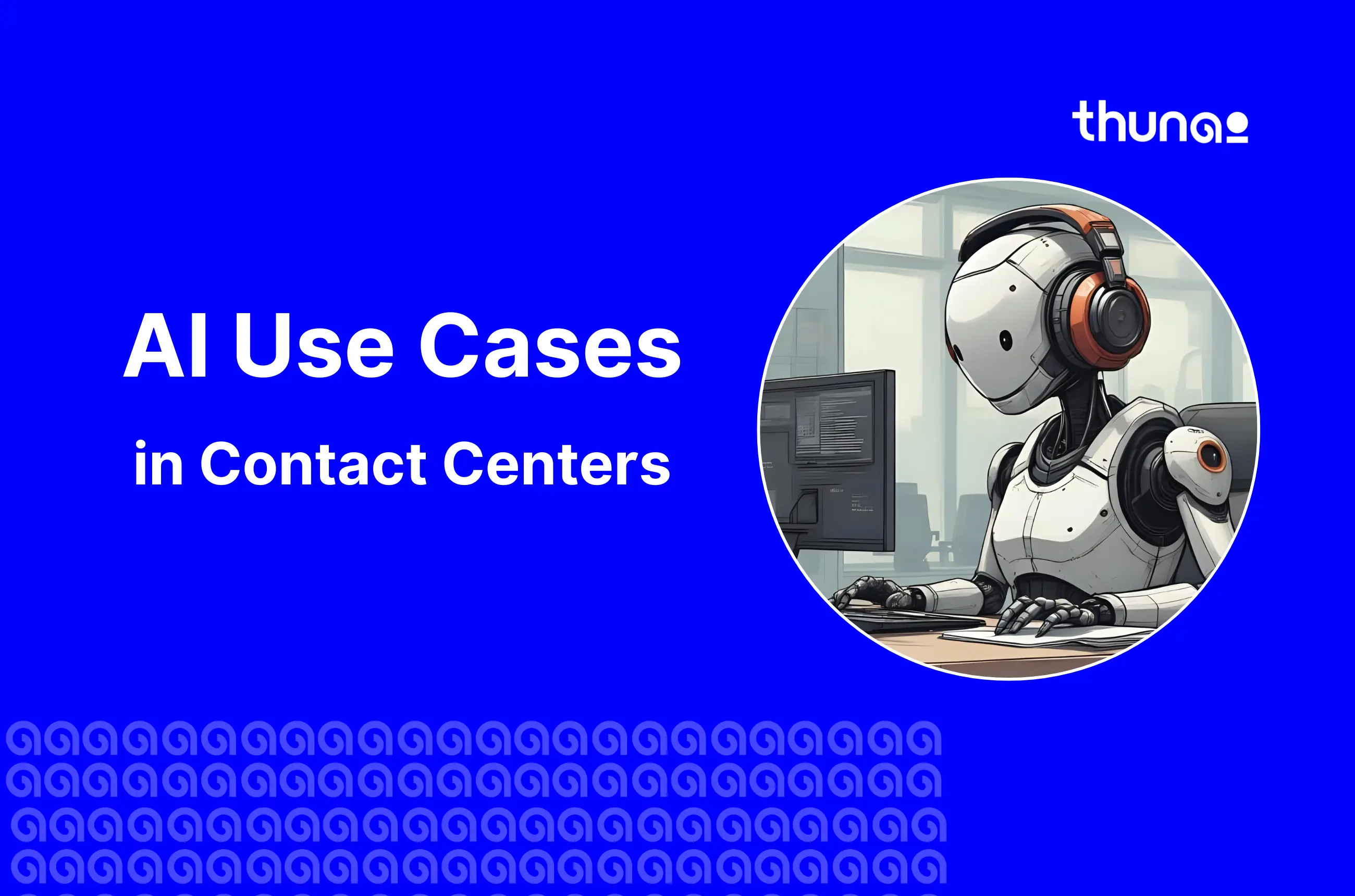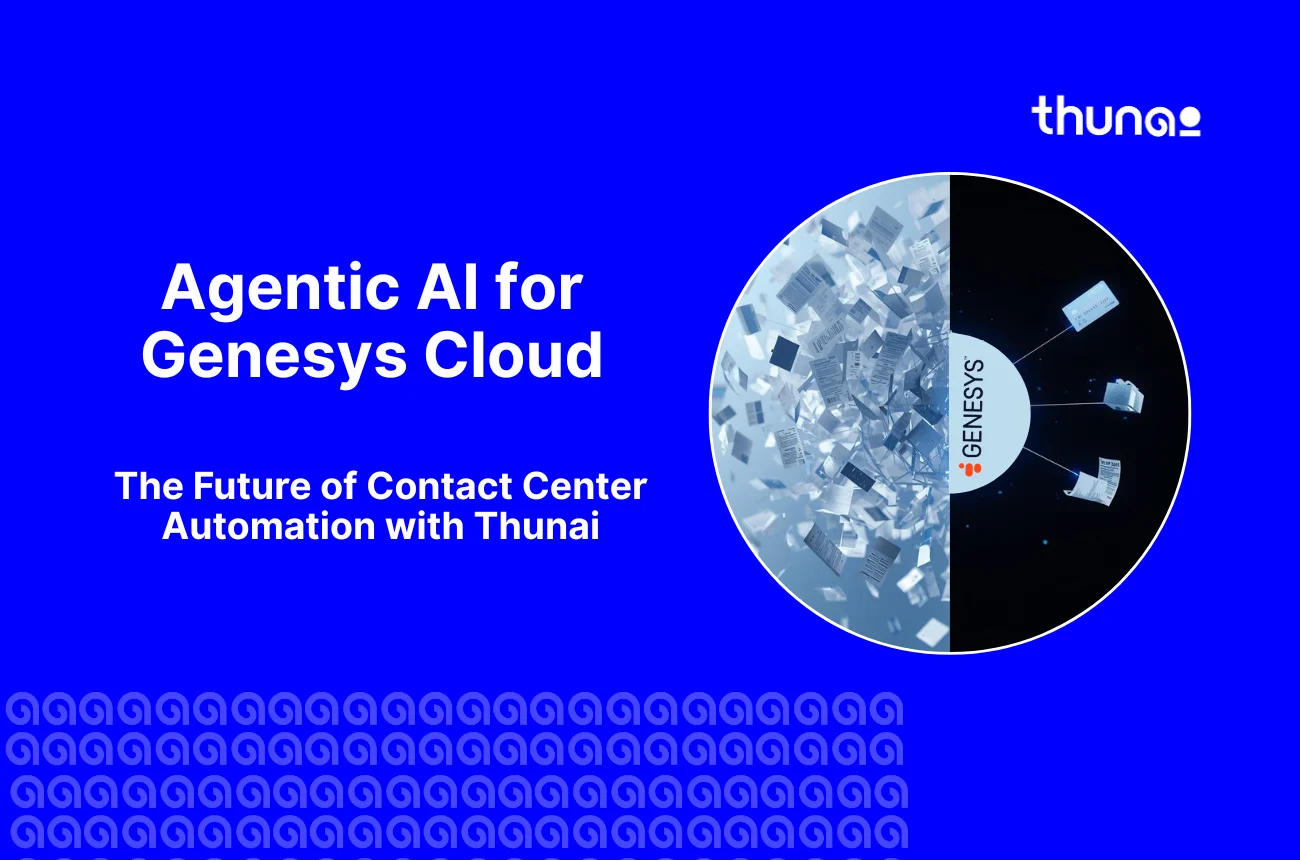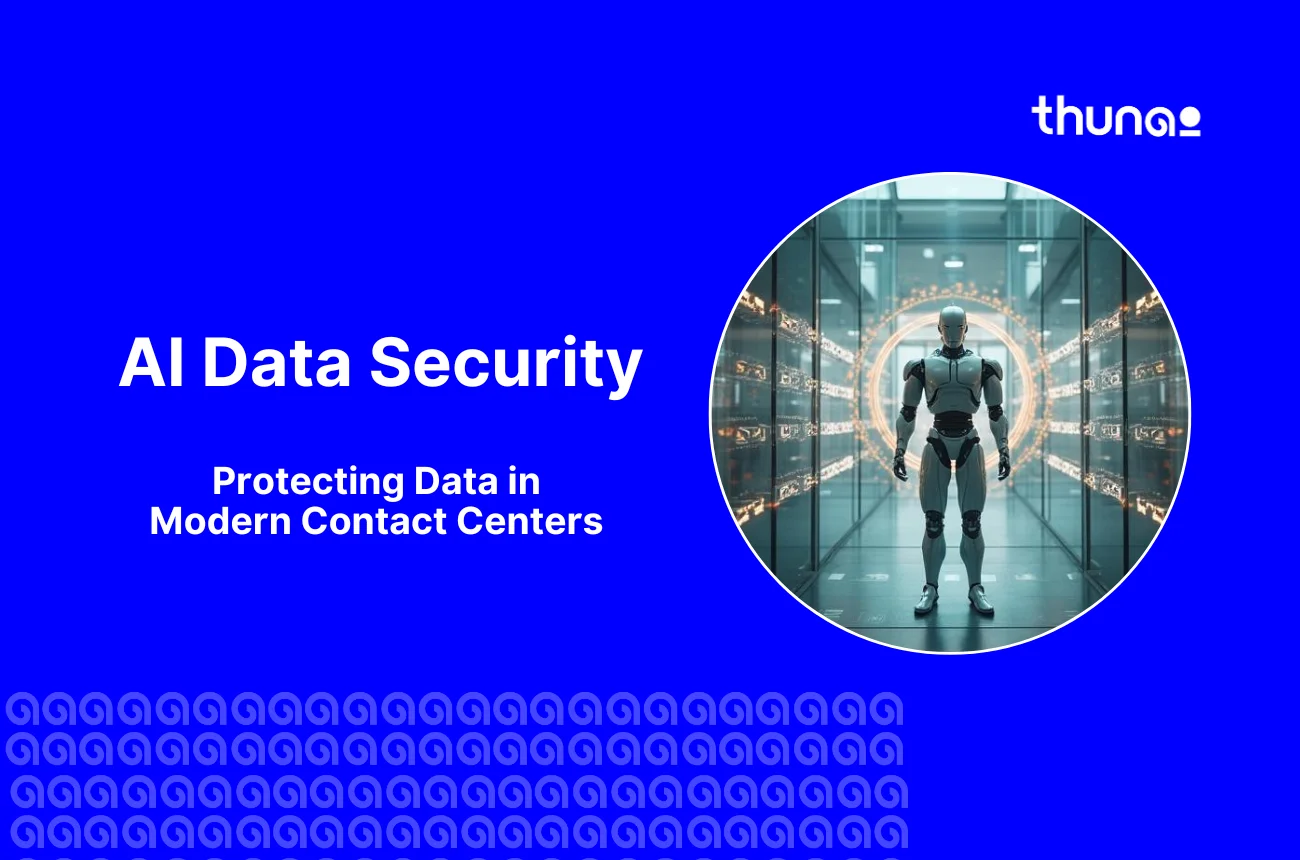Top AI Use Cases in Contact Centers in 2025



Thunai learns, listens, communicates, and automates workflows for your revenue generation team - Sales, Marketing and Customer Success.
TL;DR
Summary
- Agentic AI goes beyond chatbots by using reasoning, memory, and knowledge to take real-world actions (like updating CRMs or booking appointments).
- Ideal for automating high-volume tasks such as resolving L1 tickets, scheduling, and eliminating after-call work (ACW) with auto-summaries.
- Supports agents by providing customer history, live guidance, and analyzing 100% of interactions for sentiment and quality.
- Main benefits include lower operational costs, faster and more consistent responses, and improved metrics like FCR and AHT.
Do you have high call volumes and repetitive tickets?
Unfortunately, expanding your human agent workforce is expensive and slow.
That’s why industry leaders are turning to Agentic AI to solve these exact problems.
To help with that, this guide breaks down 8 important, real-world use cases that are actually working. We will cover the top AI use cases in contact centers and related solutions.
Why Agentic AI Matters in Contact Centers?
Old, rule-based chatbots follow static decision trees. An agentic system does not. AI use cases in contact centers can adapt their responses based on the situation.
It is built on a few main components that work together:
- Cognitive Reasoning: It studies user intent, context, and available resources. It then decides the best response or action. This lets it adapt conversations dynamically.
- Knowledge: It uses two layers. It has a foundational LLM for general language. It also has an enterprise layer with your specific FAQs, product details, and policy information.
- Memory: It has short-term memory for the current conversation. It also has long-term memory to recall past interactions and user preferences. This supports true personalization.
- Actions: This component in AI use cases in contact centers is very important. It does not just talk; it acts. It can execute tasks like triggering API calls, updating your CRM, processing a refund, or booking a meeting. It completes the entire request from start to finish.
.png)
8 Top AI Agents for Contact Center Use Cases
These theoretical functions are already delivering solid, real-world AI use case results for contact centers.
The following eight AI use cases in contact centers represent the most impactful deployments. These are creating measurable improvements with AI.
1. Customer Support and Ticket Escalation in SaaS and Service Companies
When a ticket arrives via email or chat, the AI uses NLP. It understands the customer's intent (what they want) and their sentiment (how they feel). It then cross-references this information. It checks their interaction history, the issue's technical complexity, and your agents' specific skills and current workload.
Based on this multi-factor analysis, it makes an intelligent routing decision. This AI use case in contact centers assigns the ticket to the person best equipped to resolve it on the first try.
The results are clear:
- By automating routing, AI has been shown to improve First-Call Resolution (FCR) rates by up to 30%.
- A significant 84% of customer service specialists report that AI simplifies the ticket response process.
- Verizon deployed AI models. These models now accurately find the reason for a customer's call 80% of the time. They precisely match customers with the best-suited agent.
2. Automating Appointments for Sales and Healthcare Companies
These AI use cases in contact centers deploy specialized AI voice or chat agents to free human staff from this high-volume, repetitive administrative task.
An AI agent engages the customer. It uses NLP to understand requests like, I need to book a demo, or I'd like to see Dr. Smith next week. It then connects in real-time with backend calendar and scheduling systems to check for availability.
The agent can present open slots, capture all necessary customer details, update the calendar automatically, and trigger confirmation messages via email or outgoing AI voice calls.
This is a proven, high-ROI AI use case in contact centers:
- One healthcare group saved an estimated 36,000 agent hours and $6 million annually by automating tasks like appointment booking.
- Consumer preference is shifting: 40% of customers now indicate they prefer using AI for scheduling appointments.
- Another healthcare group, using NICE's CXone platform, saved over 500 agent hours per month. It also lowered patient no-shows by 20% through automated scheduling and reminders.
3. 100% Sentiment Analysis on all Contact Center Calls
These AI use cases in contact centers use AI to systematically analyze every single customer interaction, across both voice and text. It does this to gauge customer emotion, satisfaction, and intent.
It's a two-step process. First, Speech-to-Text (STT) technology creates an accurate transcript of the call.
Second, sophisticated NLP algorithms analyze this text for specific verbal cues, language patterns, and tone to assign a sentiment score (e.g., positive, negative, angry, grateful).
This data is then aggregated into dashboards. This lets managers identify macro-level trends, pinpoint common customer problem points, and assess agent performance patterns.
4. Using AI Agents to Prompt Agents With Insight and Customer History in Real Time
AI can actively transcribe the conversation in real-time and uses NLP to detect customer intent and keywords.
Based on these triggers, the AI automatically searches your connected knowledge bases, CRM systems, and past ticket histories. It instantly gives the agent contextual information.
These AI use cases in contact centers can include step-by-step troubleshooting guides, relevant policy articles, and a summary of the customer's previous interactions.
This is one of the top AI use cases in contact centers and support units, and for good reason:
- Companies that have deployed these tools have witnessed a significant 27% decrease in average handle time (AHT).
- Google's Agent Assist platform reports that its tool can help agents handle 28% more conversations. It also simultaneously improves customer satisfaction (CSAT) by 10%.
5. Automating Ticket and Resolution Follow-Ups With Emails + Outbound AI Voice Calls
Lower your agent's after-call work (ACW) from minutes to zero. These AI use cases in contact centers use proactive, AI-based communications to manage the full spectrum of post-interaction workflows.
Once an interaction is completed, an agentic AI system can automatically generate a structured wrap-up summary. It can push it directly into the CRM. This removes manual work for the agent.
Then, based on predefined triggers (like ticket status changed to resolved), the AI can initiate the next step. These AI use cases in contact centers could involve sending a personalized follow-up email containing the ticket summary.
It could also mean placing an automated outbound call with a highly natural-sounding AI voice agent.
These AI use cases in contact centers create massive gains in output:
- Freshdesk reports that its AI copilot features, which include these automated workflows, have led to an 83% decrease in response times and a 60% improvement in agent productivity.
- Zoom's software can automatically send follow-up notifications. Customers can then track the progress of their ticket in real time.
6. Resolving L1 Tickets Automatically Via AI Voice, Chat, and Email Agents
This is a high-level AI use case in contact centers or self-service. It is the complete, autonomous resolution of high-volume, low-complexity (Level 1) customer issues by AI agents
An AI agent engages with the customer on their channel of choice. It uses Natural Language Understanding (NLU) to accurately interpret their routine query, such as a password reset request, an order status check, or a simple FAQ question.
The agent then securely connects to backend systems (e.g., order management, user authentication). It retrieves the necessary information or performs the required action. It gives the resolution directly to the customer within the same interaction.
7. Automating Billing Inquiries With the Help of Biometrics and OTPs for Authentication
When a customer initiates a billing query, the AI agent immediately prompts them for verification. These AI use cases in contact centers are done through voice biometrics, where the system analyzes the customer's unique voiceprint as they speak, or by triggering a One-Time Password (OTP) to their registered mobile number.
Once securely authenticated, the AI agent can connect to backend billing and payment systems to retrieve the requested information or process payments, all within an automated flow.
These AI use cases in contact centers are both more secure and more methodical:
- Voice biometrics can simplify verification. This lowers the average handle time (AHT) by as much as 45 seconds per call.
- Vodafone reported that 63% of customer issues are resolved without human intervention, which frequently included billing queries, were handled entirely by its AI voice assistant.
8. AI Agent Availability and Activity Dashboard Tracking
Manage your new, hybrid workforce from a single command center. These AI use cases in contact centers refers to a centralized analytics dashboard. It gives leaders a wide, real-time, and historical view of the performance, availability, and activity of both their AI agents and human agents.
Advanced AI-based dashboards move beyond static, historical reporting. They analyze data streams in real-time. They automatically highlight anomalies (e.g., a sudden spike in call abandonment) and identify emerging trends
This AI use cases in contact centers gives you complete operational control:
- Monitor AI-specific metrics such as Deflection Rate, Automated Resolution Rate, and the AI-to-Human Handoff Rate.
- Zendesk's Insights dashboard is specifically designed to show detailed AI agent performance. It highlights resolution rates and knowledge coverage gaps.
Benefits of Contact Centre Intelligence with Agentic AI and AI Agents
1. Operational Excellence and Cost Lowering
AI use cases in contact centers create profound gains in output by automating high-volume, repetitive tasks. It also allows for true 24/7 service without a linear increase in headcount.
Gartner predicts that the widespread use of agentic AI will lead to a 30% decrease in operational costs by 2029.
Real-world case studies reinforce this. One healthcare group saved $6 million annually. Teams using Agent Assist tools are seeing a 27% decrease in Average Handle Time (AHT).
2. Superior Customer Experience (CX)
Get customers answers faster. Intelligent routing removes frustrating transfers. It has been shown to improve First Call Resolution (FCR) rates by up to 30%.
On the whole, customer preference is shifting, with 61% of new buyers stating they would choose a faster AI-generated response over waiting for a human agent.
3. A Supported and Productive Agent Workforce
Stop overworking your best people. AI offloads mundane and repetitive tasks. This liberates human agents to handle more complex, emotionally nuanced, and high-value work.
This is why 78% of agents state that AI helps them attend to the most important aspects of their job. AI use cases in contact centers save them, on average, 2 hours and 20 minutes per day.
4. Actionable Business Intelligence
Stop guessing. These AI use cases in contact centers is to analyze 100% of customer interactions, making a large amount of data available that was previously inaccessible.
The contact center changes from a simple service channel. It becomes a primary source of business intelligence for the entire company.
Why Partner With Thunai for Contact Centers?
Stop replacing systems. Thunai’s agentic AI middleware works with the tools you already own.
Our AI agents automate L1 tickets, remove all after-call work, and analyze 100% of interactions for quality.
We help you lower costs, support your human agents, and find new revenue opportunities in your service calls. It is intelligence that connects to your current setup.
Want to improve your contact center automation? Try Thunai for free!
FAQs on AI Use Cases in Contact Centers
1. Will AI replace all human contact center agents?
No, but it will fundamentally change the role of a human agent. The consensus among industry experts is that AI will automate the vast majority of simple, repetitive, and transactional tasks. This will allow the human role to change.
2. Our agents are worried AI is just a new form of surveillance. How do we address this?
This is a valid and widespread concern that must be addressed directly. Unfiltered feedback reveals a strong fear of AI being used as an invasive surveillance tool. The way to overcome this resistance lies in leadership, transparency, and intent.




.webp)

